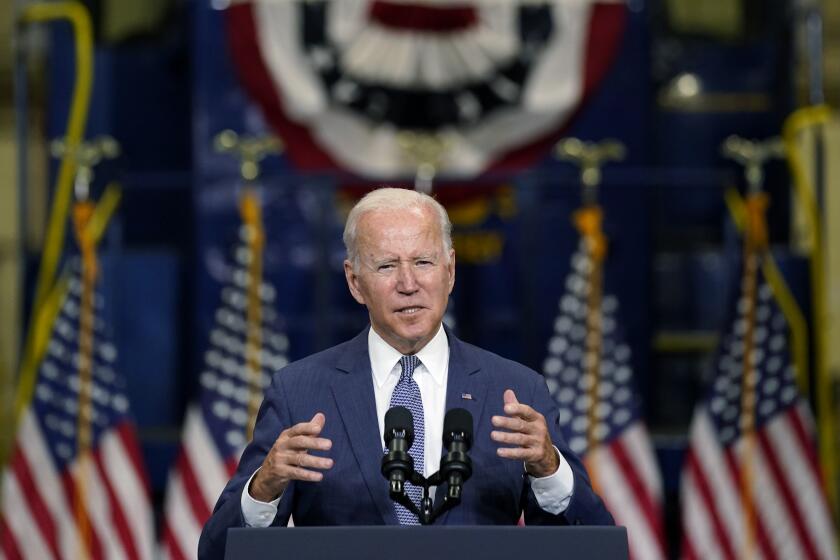California lawmaker joins other blue states in latest attempt to tax rich people
- Share via
SACRAMENTO — Even in progressive California, passing a new tax on ultra-rich residents is a longshot. But a Democratic lawmaker is trying again, this time flanked by similar efforts in other blue states.
San Jose Assemblymember Alex Lee plans to introduce a bill that would impose new taxes on California’s “extremely wealthy,” at a rate of 1.5% on those worth more than $1 billion starting next year, and at 1% for those worth more than $50 million starting in 2026.
If passed, the tax would affect 0.1% of California households and would generate an additional $21.6 billion in state revenue, according to Lee.
“This is all in the spirit of making those who are not paying their fair share pay what they owe,” Lee said, pointing to a ProPublica report that exposed how the world’s richest people use legal loopholes to avoid paying income taxes, instead amassing wealth through assets like stocks that are not taxed unless sold.
Lee’s proposed tax focuses on a person’s “worldwide wealth” — not just their annual income — including such diverse holdings as stocks and hedge fund interests, farm assets and arts and collectibles. It’s similar to proposals progressive Sens. Bernie Sanders (I-Vt.) and Elizabeth Warren (D-Mass.) championed during the 2020 presidential campaign, and to a plan President Biden floated last year that never passed Congress.
In the absence of a federal wealth tax, the State Innovation Exchange, a progressive nonprofit, and the State Revenue Alliance, which works with labor groups to call for taxing rich people, gathered a handful of states to create policy as part of the “Fund Our Future” campaign. The California bill was announced as a joint effort on Thursday alongside officials promoting similar wealth taxes targeting capital gains and “unrealized gains” in Connecticut, Hawaii, Illinois, Maryland, New York and Washington.
“States are leaning into their power. They’re reminding us that states are the laboratories of democracy,” said Charles Khan, who serves on the advisory committee for the State Revenue Alliance.
But the initiative faces an uphill battle in California despite the Democratic stronghold in the state Legislature. Similar attempts by Lee have failed before, and Gov. Gavin Newsom has shown no signs of supporting such a measure.
The Legislature is again proposing a tax on “extreme wealth” in California, a move lawmakers say could bring in billions in state revenue by raising taxes on households worth $50 million.
Newsom parted with his own party last year when he came out against Proposition 30 on the November ballot, which would have raised income taxes on the richest Californians and used the money to subsidize electric vehicles and suppress wildfires. The governor said that plan was “fiscally irresponsible” and criticized Lyft for bankrolling it, calling it a “cynical scheme to grab a huge taxpayer-funded subsidy” because ride-hailing companies must add more electric vehicles to their fleets.
Another measure that would have raised taxes on California’s richest in order to fund pandemic public health programs also lacked Newsom’s support, prompting organizers to keep it off the 2022 ballot.
In the Legislature, past attempts at a wealth tax have not made it far. Last year’s version was basically dead on arrival and did not get taken up for a vote in a single committee.
But Lee believes the legislation is more likely to succeed this time around, in part because of California’s projected $22.5-billion budget shortfall. Revenue from the proposed tax would go to the state general fund.
“This is how we can keep addressing our budgetary issues,” he said. “Basically, we could plug the entire hole.”
Lee said the national push also helps thwart concerns that California’s richest will leave to avoid new taxes, as more states could do the same. “It’s a ‘they can run but they can’t hide’ situation,” he said.
A report by the nonpartisan California Policy Lab found that there’s “little evidence that wealthy Californians are leaving en masse,” but the threat of such a loss remains.
That’s because California’s progressive tax structure makes the state budget disproportionately dependent on the wealthiest residents — and was largely to thank for the state’s flush years even during the worst of the COVID-19 pandemic.
The bill is supported by the California Federation of Teachers and opposed by the California Taxpayers Assn.
California Taxpayers Assn. President Robert Gutierrez said the state should not jeopardize losing its top earners at a time of economic uncertainty. He also questioned the fairness and practicality of a first-of-its-kind tax on assets and total wealth.
“When would the state determine the tax on stocks, whose value can change dramatically from minute to minute? Would California’s tax auditors travel around the globe every year to attempt to locate and verify the value of one-of-a-kind artwork, vehicles, iconic Hollywood props and other items whose market value can’t be known with any degree of certainty?” he said. “Would wealthy individuals stay in California and wait for these questions to be answered?”
To help pay for his big economic and social agenda, President Biden is looking to go where the big money is, and that’s billionaires.
But Emmanuel Saez, an economics professor at UC Berkeley, said the initiatives can work successfully and make a significant difference in “restoring tax justice.”
“Our current tax system, both at the federal and state levels, fail to tax the enormous wealth amassed by billionaires. Billionaires can keep profits inside their businesses and if they don’t sell their stock, they can avoid the individual income tax. If they retire in Florida and sell their businesses then, they will never pay income taxes in the state where they built their fortune,” he said. “Relative to their true economic income, billionaires end up paying a lower tax rate than the rest of us.”
The bill’s odds of passing are further complicated by the legislative procedures required to make it law.
As a tax increase, the bill requires approval from two-thirds of the lawmakers in both houses. In addition, a two-thirds supermajority would have to support an accompanying constitutional amendment to lift the current cap on taxing personal property. Then the proposal would go before voters for final approval.
More to Read
Sign up for Essential California
The most important California stories and recommendations in your inbox every morning.
You may occasionally receive promotional content from the Los Angeles Times.













